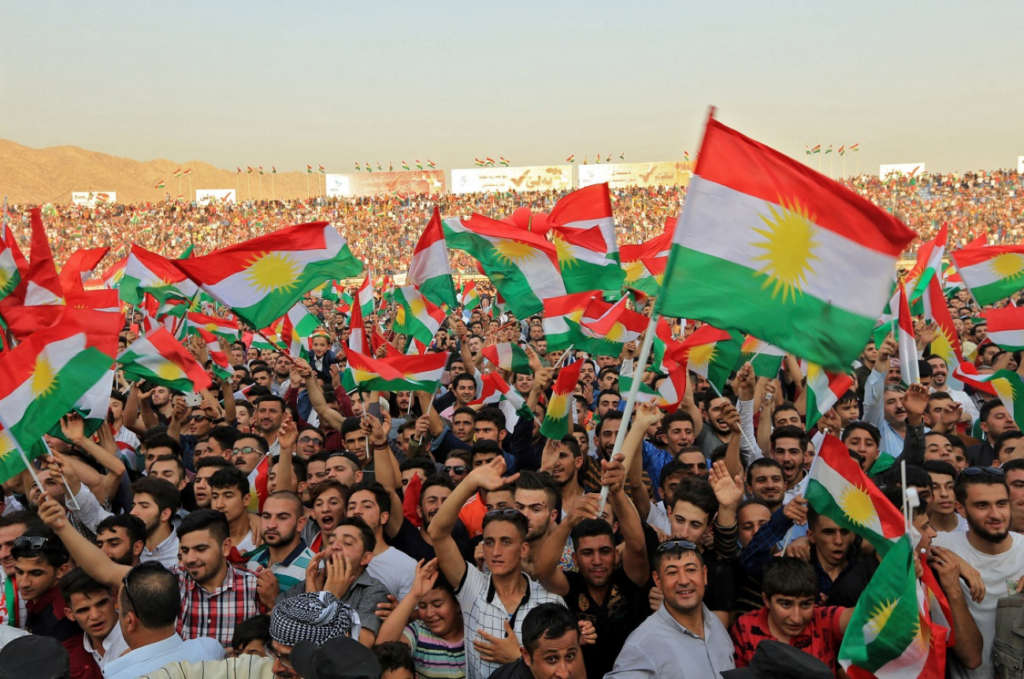I was the head of the political office at the American Embassy in Baghdad in 2005 during the long, difficult negotiations between Iraqi political leaders about the new Iraqi constitution. The negotiations centered on issues like decentralization, accountability and respect for human rights, and the powers of the executive branch, the legislature and the judicial institutions. Often the negotiations reached dead ends and the top political leaders, such as Masud Barzani, Jalal Talabani, Tariq Hashemi, Abdelaziz Hakim and Ibrahim Jaaferi had to meet to make difficult compromises. The Americans were urging Masud Barzani to accept compromises and for Iraqi Kurdistan to be part of a federal Iraq. Barzani is a tough negotiator; his family and his people suffered a lot in Baathist Iraq. He finally answered us clearly in October 2005: if the Baghdad central government respects the new constitution, the Kurdish regional government will remain in a united Iraq. He was very clear about the conditional agreement in 2005.
Twelve years later Baghdad officials have not respected key obligations of the Iraq constitution. The parliament, which has a majority from Shia Islamist parties, has not passed a law as required (Constitution article 65) to establish a second house in the parliament that would represent governorates and regions. The Baghdad government has not passed a law to establish a national supreme court (article 92) nor the law to govern the intelligence service as required (article 84). The Constitution also requires (article 80) that top military officers receive approval of the Council of Representatives. In reality, prime ministers appoint them without any approval of the council of representatives. The Constitution also forbids (article 9) militias but the government is paying the Hashd ash-Shaabi and the militias are often political which is also a violation of article 9. It is interesting to note that the Kurds won recognition in the 2005 talks for their Kurdish security force, the Peshmerga in article 121(5).
The oil dispute between Baghdad and Erbil is legally complicated and politically tough. The constitution article 112 gives both parties a role, but they still haven’t negotiated about how to manage the oil sector.
I remember that in 2005 the Kurdish political leaders were nervous that the Baghdad government under Prime Minister Jaaferi and a Shia majority parliament would not respect all the constitution obligations. The American government promised it would help ensure
the Constitution was respected. We said, for example, that we would help Iraqis find a way to solve the issue of disputed territories and Kirkuk; article 140 of the constitution requires a referendum in the disputed territories by 2007 but there the referendum was never held. In 2009 the Americans had a perfect chance to help Iraqis find a solution. The new ambassador then, Christopher Hill, was an experienced negotiator who had helped negotiations to settle the civil war in Bosnia. There were thousands of American soldiers in the area of the disputed territories that could have helped Hill’s effort. Instead, the Americans did nothing about articles 112 and 140 and now in 2017 Kirkuk and oil are big disputes.
In 2010 Vice President Joe Biden urged Barzani to support Maliki’s second mandate as prime minister. Washington pledged to help ensure respect for the Constitution and a power-sharing deal between Maliki, the Kurds and the Sunni Arabs. This agreement of 19 points included solving article 140 procedures and also was supposed to define how the council of ministers reaches its decisions with the prime minister as required by the Constitution (article 85 still not implemented). Maliki violated major elements of that deal and the violations of human rights and democratic procedures helped ISIS grow. The Americans were silent in 2012 and 2013 and only put serious pressure on Maliki after ISIS began its march in the spring of 2014. And in 2014 again Washington helped create a deal between Baghdad and the Iraqi Kurdish leadership for power-sharing in order to win Kurdish votes for Prime Minister Abadi. And again the deal was broken; article 85 still isn’t implemented. And the council of representatives with its Shia Islamist majority last week tried to fire the governor of Kirkuk even though the constitution does not give them this authority.
On September 20 Washington strongly denounced the Kurdish referendum and said that Barzani and the Kurds should instead accept a new process sponsored by the Americans and the United Nations to resolve the constitution questions and Kurdish demands. It’s not the first time the Kurds have heard this. We will see if Barzani makes a last-minute retreat. The position of Turkey, which is Erbil’s biggest economic partner and which has troops on the Kurdish border, is more important to Kurdish thinking than more American promises.
It will be important to remember that if there is a positive referendum vote, the Kurdish Region Government is not yet independent. Instead, Erbil and Baghdad need to think about channels of communication and next steps. And Ankara and Teheran will have the time for their words too. It will be important for everyone to use calm words and thinking, not anger and threats.
